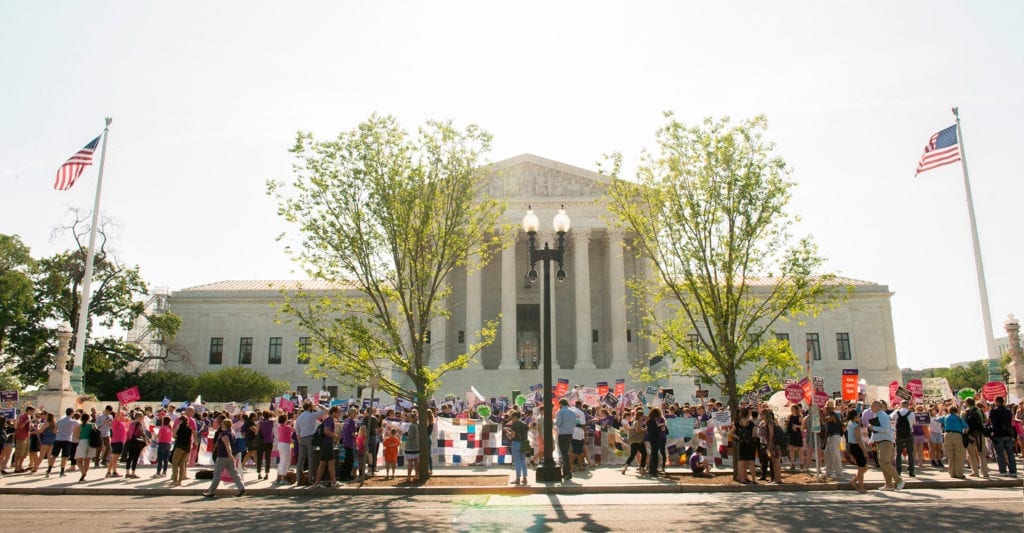Medical Groups, Legal Experts, People Who Had Abortions, and Advocates Join Fight Against Louisiana’s Anti-Abortion Law
ABA, AMA and other diverse supporters unite to urge U.S. Supreme Court to overturn Louisiana law designed to shut down abortion clinics
(PRESS RELEASE)—Yesterday, a coalition of leading voices in medicine, law, and public policy joined with abortion patients and advocates to submit 27 amicus briefs to the Supreme Court in opposition to a law that would close every abortion clinic in Louisiana except for one, leaving a single physician able to provide abortions in the state. The law is at the center of a case the Supreme Court is hearing this term–June Medical v. Gee–filed by the Center for Reproductive Rights. These “friend of the court” briefs—submitted by a collection of nearly 200 organizations and more than 700 individuals—represent a united front against medically unnecessary abortion restrictions that undermine the constitutional right to access abortion. From medical experts, to prominent legal scholars, to abortion providers and individuals who have had abortions, each signer provides unique insight on what this case could mean for the country. Some of the briefs filed include:
- Briefs representing hundreds of individual women who have exercised their right to abortion—from veterans to medical school students. One brief is signed by 368 attorneys, speaking about their own abortion stories and the importance of abortion access in their lives. They range from law students to solo practitioners to judges and law firm partners, all sharing personal stories that demonstrate how access to abortion is essential for women to be equal participants in society and make the best decisions for themselves.
- A brief from the American Bar Association (ABA)—marking the first time the ABA has submitted a brief in an abortion case–as well as briefs from a bi-partisan collection of former judges and solicitors general, warning of the risks posed to rule of law and the Constitution if the Supreme Court fails to uphold its own precedent.
- Briefs from major medical groups—including the American Medical Association and the American College of Obstetricians and Gynecologists—health care professionals and social science researchers, each demonstrating that there is no medical reason for requiring abortion providers to have admitting privileges. As the briefs emphasize, abortion is an exceedingly safe procedure with a complication rate lower than a fraction of one percent. Requiring doctors to have admitting privileges does nothing to improve the health and safety of women who seek abortion care, but instead restricts access to abortion, which has demonstrated negative effects on women and families.
- A brief from 197 current members of Congress connecting the Louisiana law to the waves of extreme and unconstitutional bans aimed at overturning Roe, and reminding the Court that members of Congress rely on precedent in order to fulfill their constitutional duty as legislators. Lead signers include Senators Schumer, Feinstein, Murray, and Blumenthal, and Speaker Pelosi, as well as Representatives Pallone, Nadler, DeGette, Lee, and Chu. Also, 22 state attorneys general filed a brief warning of the risks of departing from longstanding Supreme Court precedent and to women nationwide if the Court fails to reaffirm the constitutional right to abortion care.
- Briefs from groups that work to understand the disproportionate impacts that the Louisiana law would have on low-income people, people of color, immigrants, people with disabilities, LGBTQ people, and others who already face structural inequalities and discrimination in health care and other realms.
- Briefs from leading legal scholars in the fields of constitutional law, federal courts, and reproductive justice urging the Supreme Court to defend long-standing precedent against incursion from the Fifth Circuit Court of Appeals in its decision below.
“This diverse and unprecedented array of expert voices, individual women, and advocates paints a compelling portrait of the immense stakes in this case,” said Nancy Northup, President & CEO of the Center for Reproductive Rights. “It’s clear that support for abortion access and the rule of law spans all political parties, all professions, and all walks of life. We are relying on the Supreme Court to heed these urgent warnings and protect our constitutional right to access abortion free from burdensome restrictions, as it did just three years ago and has done consistently for more than four decades.” This case marks the first abortion rights case to be heard by the Supreme Court since the confirmations of Justices Gorsuch and Kavanaugh. In 2016, the Supreme Court struck down an identical Texas law in the landmark case Whole Woman’s Health v. Hellerstedt–-a case also brought by the Center for Reproductive Rights. In that case, the Court found that admitting privileges requirements pose an “undue burden” on the right to abortion, and that any state law restricting abortion access must provide evidence-based benefits that outweigh the burdens it imposes on abortion access. Many of the above organizations and individuals signing on to the “friend of the court” briefs also voiced their support in the 2016 case. The Center originally filed June Medical Services vs. Gee in August 2014. Plaintiffs are women’s health center Hope Medical Group, and doctors who provide abortion care. Julie Rikelman and Travis J. Tu of the Center for Reproductive Rights are lead counsel for plaintiffs, along with co-counsel O’Melveny & Myers LLP.
###
MEDIA CONTACT: Kelly Krause; [email protected]; 917-637-3649

